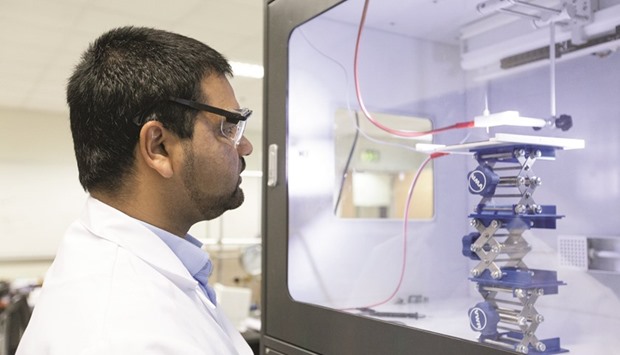The Qatar Environment & Energy Research Institute (Qeeri), one of the three research institutes under Hamad Bin Khalifa University, is in the process of conducting a pilot research into the reuse of treated sewage effluent and agricultural waste water, Gulf Times has learnt.
“A modular pilot plant will be used in the experiments to deliver improved, high-quality water that can be used for irrigation, grey water application, district cooling and other purposes” said Qeeri acting executive director Dr Khalid al-Subai.
“The reuse of treated sewage effluent will provide a major water source in Qatar for agriculture and industrial applications and reduce the demand on desalinated water and major capital investments to build more desalination plants.”
According to Dr al-Subai, the Qeeri project “Reuse of Treated Sewage Effluent and Agriculture Waste Water” aims to investigate the efficacy of ozone and ozone-based advanced oxidation process in conjunction with other treatment processes for the reuse of treated sewage effluent, industrial, and agriculture wastewater.
The official explained: “The pilot scale research would investigate the improvement and optimisation of wastewater treatment processes from reuse perspectives and the efficacy of advanced treatment technology such as ozone and ozone based advanced oxidation process to provide the required treatment.”
These applications could provide wastewater treatment plant operating authorities significant information on best practices to reduce and eliminate negative impacts from waste water effluents.
The design will include hybrid technologies to provide an optimised operation that could improve treatment process.
The official pointed out that Qeeri was dealing with two national grand challenges of water security and energy security. “Ensuring water sustainability includes identification and management of water resources; maintaining water production in terms of quantity and quality, researching the most efficient desalination technologies at minimum cost, conserving environmental quality and managing water for society,” he maintained.
Dr al-Subai said Qeeri had a project-oriented structure where basic fundamental and applied sciences are integrated to achieve water sustainability.”The main research areas are desalination technologies, groundwater mapping and recharge, and reuse of treated wastewater.
We are conducting cutting-edge research and development programmes in these three areas.
“The aims of these R&D projects are to: increase energy efficiency, reduce costs, and minimise health risks and environmental impacts.The water security grand challenge programme at Qeeri involves the research and development of innovative techniques from concepts to near market products.”
The official noted that high quality and innovative research programmes were pursued at Qeeri along with other stakeholders including Kahramaa, QWEC, Ashghal, Ministry of Environment and Municipalities, Qatar Cool as well as with industries in the oil and gas sector that use and produce large amount of water.
“A key component for achieving water sustainability is the partnerships with governmental water authorities.
Qeeri has also launched a monthly open programme called “Science Majlis” as part of its activities to raise awareness among school children and the public on the topic,” he added.

One of the researchers engaged in a water project.

